Blues Reviews
Dec 2019-Jan 2020
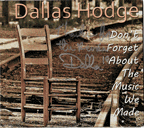 Dallas
Hodge
Dallas
Hodge
Don’t Forget the Music We Made
Self-produced 2019
Born in Detroit, Michigan, guitarist, singer, and songwriter Dallas Hodge
has been a denizen of the Golden State for over four decades. During his
time in California he has burnished his credentials in several bands and
has shared the stage with multiple luminaries including Bonnie Raitt,
Delbert McClinton, and Johnny Winter. He held the frontman spot with the
venerable group Canned Heat from 2000 to 2005. His own first album appeared
in 2007. His new one is worth the long wait.
Hodge has snazzy backing on this outing, with Larry Zack handling percussion,
Pat Wilkins on bass, Jon Greathouse manning the keyboards, and Robert
Heft plying second guitar; the crisp horns are provided by Ron Dziuba
and Lee Thornburg. The group tackles an upbeat set of nine tunes, six
penned by Hodge. One of the best is the opener, “Ask Too Much,”
which benefits from the additional guitar work of established fretmaster
Coco Montoya. Greathouse kicks off the tune with a few bars of restrained
tinkly piano, then the band coalesces for a driving blues rocker. (The
song bears a strong resemblance to the chart-topping 1980s hit “Tough
Enuff” by the Fabulous Thunderbirds.) The danceable vibe is maintained
with “Jelly Roll,” which sports some of Hodge’s best
baritone vocalizing, then “Bad Troubles” lets Heft loose with
inspired slide guitar playing in a track evoking comparison with the Allman
Brothers. Showing its versatility, the band next gives us some soul blues
with “By the Hand,” Dziuba and Thornburg excelling.
Two of the covers ensue. The first, “Hey Baby,” is a Jimmy
Reed tune that the ensemble morphs into a pithy shuffle, this time Greathouse
on piano and Wilkins on bass shining. “Love So Fine” modulates
the pace, Greathouse plays graceful organ, and the lyrical lead guitar
frames another vibrant Hodge vocal. Then, proving that this crew can adeptly
treat a slow blues, we are given the set’s longest number, “Shame
Shame,” with the lead guitar (presumably Hodge) again lyrical and
poignant until its crescendo of torrential notes at the end.
Well, it’s time for Coco Montoya’s reappearance, for a cover
of Robert Johnson’s classic “Crossroads.” Do we really
need yet another version of that song? No complaints here: Hodge adds
a little drawl to his vocal, Greathouse provides tasty organ, and the
three guitarists mesh sublimely.
The set concludes with the title tune, a return to soul blues with horns
prominent in the mix. It’s a fitting ending to an album of variety,
vivacity, and undeniable value.—Steve Daniels
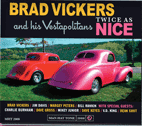 Brad
Vickers and his Vestapolitans
Brad
Vickers and his Vestapolitans
Twice As Nice
Man Hat Tone 2000
Guitarist/singer Brad Vickers cut his teeth playing bass behind some of
the pioneers of blues and early rock like Pinetop Perkins, Jimmy Rogers,
Hubert Sumlin, Bo Diddley and Chuck Berry. He notably played on the legendary
pianist Perkins’ Grammy-nominated albums Born in the Delta and Ladies’
Man. Twice As Nice is the group’s sixth release and is so titled
because of the pleasure of bringing in a cast of close friends to collaborate
with the core group of Vickers (guitar/vocals), Margey Peters (bass/vocals),
Bill Rankin (drums) and Jim Davis (tenor sax).
The Big Maceo number “Worried Life Blues” starts things off
and sets the tone of the record with a laid back groove and solos by Vickers
and Davis and guest pianist Dave Keyes. The Vickers-penned “Mississippi
Swamp” is next, following the form of Muddy Waters’ “Rollin’
and Tumblin,’” the track is driven by Vickers’ open
tuned slide guitar and features harmonica played by guest Mikey Junior,
who also appears on four other tracks on vocals as well as harp. The optimistic
“Love Can Win” is sung and was written by bassist Margey Peters,
who contributed five of the eleven tracks on the recording. On the extremely
laid back cover of Jimmy Reed’s “Close Together” Vickers’
vocal delivery is reminiscent of J.J. Cale. The MVP of the session has
to be V.D. King, who plays nine (!) different instruments, mainly baritone
sax, but also organ, guitar, banjolele, piano, upright bass as well as
vocals. On the title track, Peters invokes the risqué style of
the early female blues singers. Vickers’ original “Red Dust”
is a spooky lament for the American Indian, featuring a tribal drumbeat
and bottleneck guitar.
Brad Vickers’ clean guitar tone contains no frills, and his playing
is never flashy, but tasty and to the point. There’s a down home
charm to the album as a whole. It feels like a gathering of friends in
a comfy living room, playing songs with each other, no stress. Twice As
Nice is unpretentious and makes for a thoroughly enjoyable listen. –
Bob Monteleone
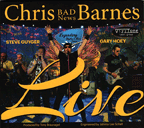 Chris
“Bad News” Barnes
Chris
“Bad News” Barnes
Live
Vizztone 2019
Chris Barnes is a former comedy entertainer, based in New York City, who
gained notice in the blues world with the release of “Hokum Blues”
two years ago. Hokum blues is the term for the sly and jocular style of
blues with sexual double entendre that was particularly popular in the
first half of the twentieth century, and Barnes applied his gruff but
appealing vocals to fourteen songs by hokum specialists Tampa Red, Georgia
Tom (the nickname of gospel great Thomas Dorsey), and the Hokum Boys.
The album was well received. Subsequently he made his virgin appearance
on the February 2019 Legendary Rhythm & Blues Cruise, from which “Live”
is derived.
Judging by the results, and the apparent enthusiasm of the audience, Barnes’s
maiden blues voyage was a success. Along for the sail was harmonica player
Steve Guyger, the only holdover from “Hokum Blues.” A sturdy
rhythm section and jazzy pair of horns back Barnes and Guyger, with guitarist
Gary Hoey also getting plenty of well deserved attention.
The album features just a few of the songs that appeared on “Hokum
Blues,” and they are quality tunes, recognizable to many blues aficionados.
Interestingly, one of them, “Keep Your Mind on It” is here
credited to legendary country bluesman Big Bill Broonzy rather than to
the Hokum Boys and Bob Robinson as on the previous album…but the
discrepancy is slightly less puzzling when one discovers that between
the late 1920s and 1940 there were at least five or six groups recording
as the Hokum Boys, and Broonzy and Robinson were involved in several of
them. Whatever; forget the quibbles; Barnes and company convert the song
into a swinging romp.
Swing is something that this band can do adeptly…and rock as well,
and do ballads, and…you get the idea: versatile. They cruise (pun
intended) through tunes by Willie Dixon, Paul deLay, George Thorogood,
and Gregg Allman without a hitch, carrying the seagoing cruisers along
with them. Barnes’ singing is spot on, Guyger excels on harp, and
Hoey provides some scintillating solos, including some slide guitar riffs.
Doug Wolverton on trumpet and Mark Earley on sax add jaunty backing.
By the way, Barnes deploys his comedy experience well in his one original
song here, “Hungry and Horny.” It’s a succinct analysis
of male psychology that may make both men and women ponder…between
guffaws of laughter.
The LRBC cruisers certainly enjoyed Chris Barnes and his crew. Thanks
to the LRBC and the efforts of producer Tony Braunagel and engineer Johnny
Lee Schell of the Phantom Blues Band, we also can enjoy this lusty and
skilled set by Barnes and colleagues.—Steve Daniels
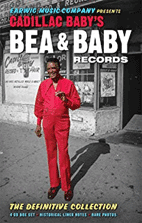 Bea
& Baby Records:
Bea
& Baby Records:
The Definitive Collection
Earwig Music Company
www.earwigmusic.com
This Dust-to-Digital-quality project, thoroughly devoted to Chicago record
label owner Narvel Eatmon aka Cadillac Baby, encompasses nearly his entire,
wildly diverse catalogue on four CDs along with an image-laden (many never
seen before) 128-page hardback book that includes informative artist biographies
by Bill Dahl, complete discographies and marvelous liners by Jim O’Neal
(taking off from a 1971 interview session with Eatmon) comprehensively
runs through the archives of one of the Windy City’s most tenacious,
personality-driven indies that began springing up cross-country after
the close of World War II (once shellac was available again!) as mostly
only local competition to the likes of local majors like Chess, Vee-Jay
and Brunswick. As Jim O’Neal puts it in his introductory essay:
“ In a teeming South Side underworld populated with hucksters, hustlers,
rogues and enterprising impresarios ruling their own blocks of turf, Cadillac
Baby stood out as one of the most irrepressible and colorful characters
of all. Though not a singer or musician, in his own right he was a more
engaging entertainer than most of the blues artists in Chicago—including
those he recorded for his Bea and Baby label and booked at his nightclub.”
That’s an assertive statement but once you listen to what Eatmon
recorded, from both urban and country blues, rhythm & blues, vocal
groups, soul, gospel (ten great titles with artist notes by Robert M.
Marovich) and even some comedy and hip hop tracks along with scattered,
frank interview segments (from a Steve Cushing “Blues Before Sunrise”
radio show broadcast circa 1983) one realizes Eatmon’s genius. Things
start off with Cadillac “welcoming” festive patrons to his
Show Lounge club and name-checking supposed “guests” like
B.B. King, Sonny Boy Williamson, Willie Dixon and Magic Sam as well as
artists Cadillac got into a studio. One of the most prolific, Eddie Boyd,
has eight numbers here (including “Blue Monday Blues” and
an ebullient “Thank You Baby”) with Little Mack Simmons featured
on, count ‘em twelve titles (a descriptive “Times Are Getting
Tougher” and a fiery recall of Elmore James’ and the topically
trippy “Let Hootennany Blues (Out Of Jail) “ are picks) with
single or double shots from the likes of L.C. Mckinley, Bobby Saxton (with
the label’s downbeat best seller “Trying To Make A Living”),
Earl Hooker (an inventive “Dynamite”), Detroit Junior and
the enigmatic T. Valentine rounding affairs out. Similar treats abound
on the followup disc with Hound Dog Taylor’s house-rocking slide
guitar shining on a pair (check out “Take Five”) with Chicago
piano patriarch Sunnyland Slim pounding the keys on “Worried About
My Baby” and “Drinking And Clowning” along with appearances
by James Cotton, Andre Williams, Lee Jackson and Tall Paul Hankins &
The Hudson Bros. with the latter extolling “Joe’s House Rent
Party” on a two-part blues/jazzy rave-up. Also noted is Clyde Lasley’s
boisterous tale of an inebriated St Nick, “Santa Came Home Drunk,”
that cleverly mentions every brand of booze available in Cadillac’s
bar! The 23 tracks on disc three feature further selections by not only
Little Mack (six sides including vivid remakes of both Little Junior Parker’s
“Mother-In-Law Blues” and Sonny Boy’s “Help Me”)
but also the seemingly indestructible Sunnyland Slim (five numbers with
a rocking “She Got That Drive” and the jumping “House
Rock” standouts) as well as three previously unissued sides by
slide guitar maven Homesick James (highlighted by the devil-may-care instrumental
“Homesick Sunnyland Special,” where he’s joined by Slim)
and four efforts by Howlin’ Wolf’s bass player Andrew “Blueblood”
McMahon—highlighted by a pair of nice shuffles, “Special Agent”
and “Potato Diggin’ Man.” Disc four features the ten
fervid gospel tracks mentioned above (the Gloryaires, Eddie Dean &
The Biblical Aires, the Norfolk Singers, the Pilgrim Harmonizers and Rev.
Samuel Patterson on two tracks each) along with four previously unissued
titles by the pre-war duo of guitarist Sleepy John Estes and harmonica
ace Hammie Nixon as Estes pays tribute to his longtime friend on “Cadillac
Baby Passed So Fast” and goes sanctified on “Worry My Mind,”
“Spirit Don’t Leave Me” and “Lay My Burden Down.”
Other picks feature another Howlin’ Wolf bandmate, Willie Williams,
on a couple of sides (accompanied by Carey Bell and Slim) and three novelty
numbers—including “I Bet I Don’t Die Tired” and
“The Preacher, A Deacon & A Razor.” Overall, a definitive,
well-researched, eyes-wide-open, Grammy worthy project by Earwig’s
Michael Frank devoted to one of the unsung heroes of Chicago blues.—Gary
von Tersch
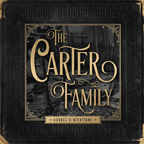 The
Carter Family
The
Carter Family
Across The Generations
Reviver/Legacy Records
From 1927 to 1943, the Original Carter Family—A.P. Carter , his
wife Sara and Sara’s first cousin Maybelle—made over 300 studio
recordings and, along with a few others, spread country music around the
world. This sort-of concept album, featuring five generations of Carter
family members also includes the previously unheard last recordings of
Maybelle Carter, Sara Carter, Helen Carter, Anita Carter and June Carter
Cash. Pulled together by John Carter Cash, it proves a fascinating aural
scrapbook with thirteen numbers, mostly composed by A.P. with the exception
of the set-opening, transfixing rendition of the traditional “Farther
Along” (with Coy Bayes on whistle), a Danny and David Carter original,
“Maybelle,” “composed the very day “Mother”
Carter left this mortal frame,” according to Cash and “Maybelle’s
New Tune,” an exhilarating electric autoharp instrumental she likely
recorded in the early 1970s. Other gems include the all-hands-on deck
version of “Will The Circle Be Unbroken,” a pair that include
Johnny Cash playing guitar (“Gold Watch and Chain” and “Don’t
Forget This Song”), spellbinding recalls of both “Diamonds
In The Rough” and “Foggy Mountain Top” (with Lux Darling
on percussion), another all-hands-on-deck, vocally-rich rendition of the
A.P. classic “Worried Man Blues” and the traditional-sounding
“I Never Will Marry”—with both Norman Blake and J.R.
Cash playing guitar. More please!—Gary von Tersch
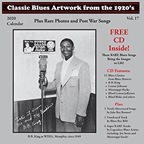 Various
Artists
Various
Artists
22 Classic Blues Songs From The 1920’s—1950’s
Blues Images 2020 Calendar
info@bluesimages.com
Since 2004, the folks at Blues Images, up in bucolic Grant’s Pass,
Oregon, have been earnestly dedicated to bringing blues fans worldwide
often stunning reproductions of vintage blues advertising artwork, rare
photographs and related recorded music. In addition to an astute, ad-hinged
selection for each of the year’s twelve months—from January’s
B.B. King’s revelation from the summer of !949, “Got The Blues”
(for Bullet Records with Ike Turner, Willie Mitchell and Hank Crawford
in attendance) to December’s offering from Mississippi Sarah and
her husband Daddy Stovepipe, for Vocalion Records in 1931, titled “Read
Your A B C’s,” this years eagerly awaited 17th annual calendar
also includes a riveting trio of recently discovered demos by ill-fated
singer, guitarist and harmonica player Juke Boy Bonner, who reveals an
affinity for Lightnin’ Hopkins and Slim Harpo on both “Life
Is A Cheater” (two versions) and “I Got Hip To It” along
with both riveting sides of an obscure 78 by one mysterious Blues Boy
Bill (“Come On Baby” and “Little Boy Blue”) as
well as pair by Jaydee Short—the rambunctious “It’s
Hard Time” and the more reflective “Back Door Blues.”
Highlights among the calendar numbers include Jim Jackson’s slow
but steady, two-part “I’m Gonna Move To Louisiana” along
with Blind Lemon Jefferson’s downbeat “Bad Luck Blues,”
the wry advisory “She’s Making Whoopee in Hell Tonight”
and Bessie Smith’s particularly bawdy version of “Shave ‘Em
Dry.” Further stupendous sounding cuts feature the likes of Victoria
Spivey (the first to record Bob Dylan), the irrepressible Mississippi
Sheiks (including Texas Alexander on a bleak “Days is Lonesome”),
Charlie Spand, Bo Carter with his “Howling Tom Cat Blues”
and two great numbers with vocalist Leola B. Wilson joining Blind Blake
on “Ashley Street Blues” and the deep-down “Dying Blues.”
Also noted are the abundance of ad reproductions (large and small), personality
photos (including the previously unseen cover shot of B.B. King from 1949),
birth and death dates. The perfect Christmas gift for any blues fan!—Gary
von Tersch
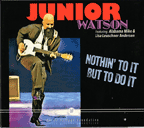 Junior
Watson
Junior
Watson
Nothin’ to It but to Do It
Little Village Foundation 2019
Many blues aficionados know of Junior Watson, but for those of you unfamiliar
with this iconic Left Coast musician, it’s past time for an introduction.
A founding member in the early 1980s of Rod Piazza’s Mighty Flyers,
after a ten-year stint with that award-winning band Watson spent another
decade as lead guitarist for Canned Heat. His name has appeared through
the years on innumerable albums by such blues royalty as Big Mama Thornton,
George “Harmonica” Smith, Charlie Musselwhite, Kim Wilson,
Mark Hummel, James Harman…the list goes on. Over the last couple
of decades he has been freelancing; his discography is extensive. He is
highly respected by fellow guitarists for his “fat” guitar
tone and jazz-inflected creativity. Kid Andersen, guitar maven himself
and co-producer of this album, goes beyond promotion to reverential praise
in his liner notes here.
Surprisingly, Watson’s own album releases have been few and far
between, so this set put out by the non-profit Little Village Foundation
- established and headed by keyboard ace Jim Pugh - is welcome. The fifteen
tracks provide almost an hour of tasty tunes, mostly covers, with two
of Watson’s own compositions.
More surprisingly, Watson’s playing isn’t the major focus.
This is consistent with his career: he always seems to be the impeccable
guitarist of a sterling ensemble, purveying steady rhythm and scintillating
leads without occupying the spotlight. Whether Watson rejects the spotlight
or has never been given his due, that is the role he again assumes here.
The formidable crew assembled here includes bassist Kedar Roy, drummer
Andrew Guterman, vocalists Lisa Leuschner Andersen and Alabama Mike, and
harmonicat Gary Smith, along with the two musicians who are actually most
prominent: Sax Gordon on (you guessed it) sax, and the aforementioned
Jim Pugh on keyboards. The set’s prevailing pattern is revealed
on the first track, the swinging instrumental “Up and Out,”
which is driven by Gordon and Pugh until Watson finally delivers a brief
solo toward its end. On “Luella,” a mid-tempo shuffle featuring
Watson’s own competent singing, his guitar solo is innovative and
compelling, but still relatively brief. We do get more on “A Shot
in the Dark,” a slow blues sung passionately by Alabama Mike and
both introduced and concluded by sublime guitar leads.
Also worthy of mention is the instrumental “Summer Love,”
the only track where Watson is the undeniable focus as he plays some sinewy
surf guitar; and “So Glad She’s Mine,” a shuffle with
a 1950s rhythm-and-blues sensibility, with Watson dealing out a chord-based
introduction and some superb backing and fills. Those who crack open this
album hoping to hear Junior Watson strut and shred will be disappointed,
but those who appreciate his somewhat understated but creative and classy
chops and his fine fellow bandmates will be pleased.—Steve Daniels
 Junior
Watson #2
Junior
Watson #2
Nothin’ To It But To Do It
Little Village Foundation
A fixture on the West Coast blues scene, guitarist/singer Junior Watson
has over 50 recording session credits to his name. He was a founding member
of The Mighty Flyers and part of the venerable group Canned Heat for most
of the 1990s. A short list of the many folks he’s performed or recorded
with includes Big Mama Thornton, Charlie Musselwhite and Kim Wilson.
The fifteen track Nothin’ To It But To Do It was produced by Junior
Watson and Kid Anderson and not only features Junior’s greasy jazz-tinged
blues licks throughout, but showcases a couple of fine guest vocalists.
Lisa Leuschner Anderson sings five of the songs and Alabama Mike lets
loose on a couple, especially “A Shot in the Dark.” The swingin’
instrumental “Up and Out” starts things off with Watson and
sax man “Sax” Gordon sharing the melody or “head”
as jazz folks like to refer to. A sax and organ solo is followed by a
nice turn by Watson. It’s the perfect warm up, you can imagine the
band opening their set at some dark club with this number, stretching
their muscles before the heavy lifting comes in. “Ska-Ra-Van”
is a playful ska version of Duke Ellington’s jazz standard “Caravan.”
“Summer Love” has a bossa nova feel and follows a long line
of fine Watson-penned instrumentals that are always a pleasure to hear.
“Well, You Know” features some fat harmonica sounds from Gary
Smith and the underrated vocals of Junior. “I Found You” is
a slowed-down version of James Brown’s “I Got You (I Feel
Good)” featuring a sassy vocal turn by Anderson. Watson really tears
it up on the closer “You’re Gonna Need Me Before I Need You.”
The rhythm section of bassist Kedar Roy and drummer Andrew Guterman is
solid and this whole record feels like it could have been plucked off
my grandfather’s turntable in 1959. Jim Pugh shines on piano and
organ. His refreshing organ sound is quite different from the standard
B3 Hammond we typically hear. It’s not a Farfisa, maybe an old Univox?
Nothin’ To It But To Do It is another great Junior Watson album,
his unique ability to fuse traditional blues tones with jazz chordal touches
leave him with few peers in the music world and he owns every note he
plays. It’s been a while (7 years) since his last solo release,
let’s hope the wait isn’t as long for the next one. –
Bob Monteleone
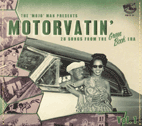
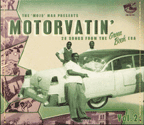
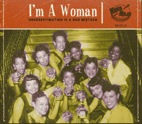
VAR IOUS ARTISTS
Motorvatin’/ Volume One/ 28 Songs From The Green Book Era
Koko Mojo CD
Motorvatin’/ Volume Two/ 28 Songs from The Green Book Era
Koko Mojo CD
I’m A Woman/ Underestimation Is A Bad Mistake
Koko Mojo CD
The Negro Motorists Green Book was a guidebook for African-American road-trippers
published by a Harlem, New York mailman, Victor Green, from 1936
to 1966 during the era of Jim Crow laws, when open and often legally enforced
discrimination against African Americans and other non-whites was widespread.
As compiler Little Victor Mac (a.k.a. DJ Mojo Man) explains “The
Green Book had a listing for everything from where black people can stay
like hotels, motels and tourist homes where folks opened up their houses
to travelers, and also cited restaurants, barber shops, cheap gas stations,
clubs, liquor stores as well as vacation and recreation spots.”
This marvelous pair of Koko Mojo ‘motorvatin’ CDs features
nearly 60 transportation-oriented (lotsa Cadillacs and Thunderbirds),
solid rhythm ‘n’ blues numbers that were current on the radio
and jukeboxes at the time. Volume One, for instance, has two Chuck Berry
classics (“Maybellene” and his version of “Route
66”), Jackie Brenston and Ike Turner’s groundbreaking “Rocket
88,“ a stunning Freddy King instrumental “Driving Sideways,”
Jimmy Liggins’ epic “Cadillac Boogie,” Lightnin’
Hopkins extolling the merits of his “Big Black Cadillac,”
Jerry McCain’s cautionary “Stay Out Of Automobiles”
and Chuck Willis’ hard-driving “Keep A-Driving.” More
obscure selections feature equally-talented-but-never-got-the-break artists
such as Big Boy Groves (“Gotta New Car”), Vernon Green (“Coupe
De Ville Baby”), Jack Cooley praising his “50 Dyna-Flow”
and The Nite Riders’ opening advisory about “Women & Cadillacs.”
The highway magic continues on Volume Two with three incendiary numbers
by Chuck Berry (“No Particular Place To Go,” “Jaguar
And Thunderbird” and the blazing “You Can’t Catch Me”),
Howlin’ Wolf’s eerie “Riding In The Moonlight,”
Little Walter And His Jukes’ “Thunderbird” while Clarence
Garlow proffers an entrancing travelogue with “Route 90” and
Sunnyland Slim recalls “Highway 61” as Nat King Cole breezily
counts off the cities on the aforementioned Bobby Troup classic “(Get
Your Kicks On) Route 66.” Further zingers include Pete Johnson’s
rollicking “Rocket Boogie 88, “ Todd Rhodes delivering “Rocket
69,” the Cadets with “Car Crash,” Peppermint Harris’
downbeat “Cadillac Funeral” and Mr. Bear And His Bearcats
with his cautionary “Radar.” Not a clunker in the bunch! And
let me allow the Mojo Man himself introduce yet another formidable Koko
Mojo project, I’m A Woman (Underestimation Is A Bad Mistake), in
his own inimitable fashion: “Hepcats, let me elucidate you about
what a woman could do back in the day in their own words: ‘I can
wash out forty four pairs of socks and have ‘em hangin’ out
on the line/I can starch and iron two dozen shirts ‘fore you can
count from one to nine/ I can scoop up a great big dipper full of lard
from the drippings can/ Throw it in the skillet, go out and do my shopping,
be back before it melts in the pan/ ‘Cause I’m a woman! W-O-M-A-N,
I’ll say it again’...” That’s citing Christine
Kittrell quoting the songwriting of Leiber and Stoller fame and it sets
the theme for what follows from a wide variety of labels, both majors
and minors, from Modern, Sue and Vee-Jay to Fire, King and Cobra. Particular
ear-turners begin with Irma Thomas’ “Don’t Mess With
My Man,” Mickey Champion’s “Bam-A-Lama,” Mary
Ann Fisher’s “Put On My Shoes,” Sugarpie Desanto‘s
“Going Back Where I Belong,” Lula Reed’s “Sick
and Tired,” Priscilla Bowman’s “Hands Off” and
Etta James’ “It Ain’t One Thing.” Little knowns
such as Mary ‘B’, Sally Stanley, Baby Jean, Ella Reed
and Barbie Gay also hit the ball out of the park. Get ‘em all while
you can!—Gary von Tersch
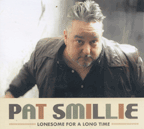 Pat
Smillie
Pat
Smillie
Lonesome For
a Long Time
Fat Bank Music
Pat Smillie is a Detroit-based soul/blues singer who performs with his
own band as well as with guitarists Jim McCarty (Detroit Wheels, Cactus)
and Dennis Coffey (Motown session luminary). Originally from Detroit,
Smillie earned a reputation as a powerhouse vocalist on the Chicago blues
scene, including a residency at the legendary Checkerboard Lounge. Relocating
back to the Motor City in 2015, he hooked up with the esteemed guitarist,
bandleader and producer Josh Ford (aka Motor City Josh). Lonesome For
A Long Time is Smillie’s first release in ten years, a six song
EP filled to the brim with full productions, four of which feature Keith
Kaminski’s (Bob Seger) horn arrangements. Produced by Ford (who
plays bass on the recording) and Smillie at Ford’s Sound Shop Studio,
all of the songs are originals, mostly co-written by Smillie and Ford.
Smillie is kind of a northern version of Delbert McClinton, effortlessly
handling blues, rock and soul styles in the vein of Joe Cocker, Mitch
Ryder and classic soul singers Otis Redding and Wilson Pickett.
The catchy “Ain’t No Doubt About That” starts things
off with a bouncy Motown groove, with the ever present horns punctuating
the accents with back-up vocals from Tina Howell and Ashley Stevenson,
who sweeten five of the tracks. The title track is built on a strong early
70s Memphis backbeat, and sounds like it could have come off a classic
Bob Seger or (gulp!) Kid Rock album. Nice solo by guitarist Johnny Rhoades.
“Boulder City Breakdown” is a vehicle for guest Jim McCarty,
who takes us back to his Rockets days, dueling pianist Evan Mercer with
his trademark riffs. The EP closes with the gut wrenching “Ray Charles
Records” as Smillie finds his ex’s old LPs and takes a painful
walk down memory lane, with Motor City Josh contributing some emotional
slide guitar.
As always, ace drummer Todd Glass never disappoints, handling the various
grooves and styles with ease. Lonesome For a Long Time is a satisfying,
if brief (no filler!), collection of well-written and produced songs with
heart-tugging lyrics sung from deep down in the soul. –Bob Monteleone
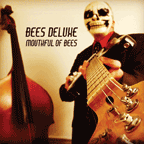 Bees
Deluxe
Bees
Deluxe
Mouthful of Bees
Slapping Cat Records
Bees Deluxe is a Boston-based “acid blues” band that plays
up and down the East Coast, largely in New England and semi-regularly
in NYC. Mouthful of Bees follows 2018’s View of a Dog. Unlike View,
which contained all original songs, Mouthful of Bees is mostly covers.
But what a nice set of covers! Songs popularized by Albert and Freddie
King, Etta James, Otis Rush and more get the “Bee” treatment
on this eclectic album. The band members include Conrad Warre on guitar/vocals,
Carol Band on keys/vocals, Allyn Dorr on bass/vocals and drummer Paul
Giovine. Warre has chops galore and morphs from a clean chorusy tone to
a fuzzy stampede throughout the album, sometimes within the same song.
“Voodoo Doll” starts the recording off appropriately enough
with a feedback wheeze settling into a rock shuffle, very ZZ Top-like
in a great way. Etta James’ classic “Damn Your Eyes”
follows with a long buildup to a tasty guitar solo filled with Robbie
Robertson/Billy Gibbons-styled “squawk” harmonics. Robben
Ford’s “Prison of Love” ventures into some freeform
Zappa-esque territory while the instrumental original “Blue + Yellow”
(a highlight) gets psychedelic, with Warre at one point doing some backwards
slide guitar riffing. “Homework,” also covered by a Boston
group named The J. Geils Band, features some nice tom fills by Paul Giovine.
The whole album is refreshing to hear as these folks obey few of the traditions
most current blues bands adhere to. The blues “Fun Police”
would simply not allow some of the abstractions Bees Deluxe throw in their
music, I guess that’s what earns their title as an “acid blues”
band. This is all blues, it’s just from a different perspective.
I like it. – Bob Monteleone
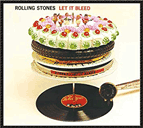 Rolling
Stones
Rolling
Stones
Let It Bleed: 50th Anniversary Limited Deluxe Edition
ABCKO Box Set
Released shortly after the band’s 1969 sold-out American Tour (maybe
you were there), their tenth American album, Let It Bleed, was the American
roots music-inspired follow up to 1968’s cutting-edge Beggar’s
Banquet—recorded when the band was in turmoil as blues maven Brian
Jones, the band’s visionary founder and original leader, had become
increasingly unreliable in the studio due to heavy drug use. For most
Bleed recording sessions Jones was either lost in the ozone or absent
altogether. Jones was also deeply disturbed over the more mainstream,
non-blues oriented direction the band was heading toward and quit on principle
in June, 1968—he only appears on two tracks here (the country blues
“Midnight Rambler” and the under-sung “You Got The Silver,”
that also tellingly featured Keith’s first lead vocal foray) playing
very incidental congas and autoharp. His final recordings—he was
dead less than a month later. The album reached # 1 in the UK and # 3
in the US and while no high-charting singles occurred, quite a few of
the album’s songs soon became staples of the band’s live repertoire
and rock radio station play lists for years to come—notably the
sadly prophetic “Gimme Shelter,” a gospel-infused “You
Can’t Always Get What You Want,” the early c&w-oriented
“Country Honk” and an appropriately brutal recall of Robert
Johnson’s classic “Love In Vain.” Anyway, it’s
all here, and then some, as ABCKO has presciently issued this “50th
Anniversary Limited Deluxe Edition—a Hand Numbered Box Set that
includes an 80 page Hardcover Book with never-before-seen photos (Ethan
Russell) and cogent essay (David Fricke), 2 180 gram LPs (Stereo and Mono),
Restored Original Album Art, Remastered Audio by Bob Lidwig, a 7”
single of “Honky Tonk Women” In Mono With Original Single
Art, 3 Hand Numbered Replica Signed Lithographs Printed On Archival Paper
and an Original Full Color Poster From The 1969 Decca Album Release.”
Nuff said! Long live Brian Jones!!—Gary von Tersch
Home
/ Blues Blogs /
Artist Links / Blues
Links / Videos / Store
Subscribe / Advertise
/ Back Issues
/ Contact / Staff